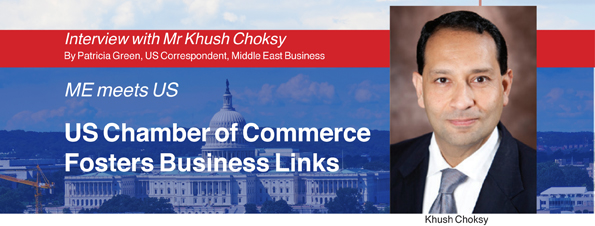Doing Business in the Middle East: ME meets US
US Chamber of Commerce Fosters Business Links
Patricia Green, US Correspondent, Middle East Business
United States interest in Middle East trade relations is growing. There are many reasons why. What’s most apparent is that it makes bottom line good business sense. Technology offers accessibility and convenience of product to consumer. From the mobile banking industry to social media, links are forming that have a wow factor and, most importantly, a consumer value.
The U.S. Department of Commerce International Trade Administration has a full suite of country specific export promotion services. Bilateral trade agreements, a competitive dollar, and high oil prices are among motivators that drive U.S. companies to pursue Middle East business opportunities. The U.S. Chamber of Commerce, the world’s largest business organisation with over 3 million members, works with member companies, business, and government leaders to broaden commercial relationships between U.S. and M.E. countries. Khush Choksy, Vice President for Turkey and Middle East Affairs, leads this task.
Choksy joined the U.S. Chamber of Commerce in 2010 and is a foremost authority on trade and investment matters between the United States and the Middle East.
Having lived and worked in Jordan for seven years, where he established relations with private and public sector leaders, gives Choksy unique advantages. His portfolio also includes India where Choksy oversaw U.S. government and World Bank-funded projects that helped liberalise the capital markets and financial sectors.
Middle East Magazine & News sat with Choksy for a Q & A recently. He expounded on trade and investment opportunities in the Middle East for member companies.
Q – What is the percentage of Chamber members doing business with ME businesses?
A – We work actively with over 150 companies in the Middle East region.
Q – Which ME country has the largest degree of trade relations with the United States? What industries?
A -Saudi Arabia and the United States have the highest bilateral trade volume in the region at $61bn, with the following industries driving this exchange: automotive, aviation, chemicals, machinery, energy, and medical instruments. Top U.S. export categories include vehicles, machinery, electrical machinery, optic and medical instruments, and aircraft. Imports into the United States from Saudi overwhelmingly come from mineral fuel (oil), organic chemicals, fertilizers, iron, and steel products. Several Chamber members are industry leaders in these sectors and heavily invested in Saudi Arabia.
Q -Is business with M.E. companies primarily import or export? Are business areas IT, ICT, textiles and/or automotive?
A – U.S. companies are both importing and exporting goods with companies in the Middle East. The region traditionally has been an exporter of energy products and chemicals, in addition to textiles produced within the Qualified Industrial Zones between Egypt, Israel and Jordan. The United States’ largest exports into the region come from the automotive industry, aviation/defence, ICT, electronics, and consumer products.
Q – What is the future of e-trade exchange between the Middle East and the United States?
A – The financial services, insurance, and ICT sectors conduct a large portion of their business in the Middle East by way of the Internet, and will look to continue doing so.
With many countries in the Middle East investing significantly in Internet connectivity and the growing population of younger people in the region increasingly connected online, e-trade between the two regions can be expected to rise. Online start-ups in the region have increased and are providing opportunities for the Internet-savvy to become entrepreneurs. The U.S. is the world leader in this area; there are tremendous opportunities for U.S. business engagement.
Q – How do you encourage companies to do business with Middle Eastern countries?
A -The U.S. Chamber of Commerce Turkey and Middle East Affairs programme facilitates trade between the United States and the Middle East through bilateral business programmes as well as an intra-regional trade initiative. The Chamber is home to bilateral business councils and initiatives with Bahrain, Egypt, Iraq, Israel and Turkey. Within each of these programmes, U.S. Chamber member companies participate in meetings with high-level government officials, business delegations, forums on business opportunities, and policy advocacy. The Chamber also provides customised support for companies in the Gulf Cooperation Council (GCC) region. In addition, the Chamber is working to enhance intra-regional connectivity through its Middle East Commercial Centre (MECC) initiative. This initiative unites leaders in the business communities from Egypt, Israel, Jordan, Palestine, Turkey and the United States to focus on improving regional trade in four priority areas, including:
– Removing trade and investment impediments that undermine economic activity
– Serving as a bridge to help companies and associations across the region connect with one another
– Enhancing and expanding American corporate presence in the region
– Improving the lives of people across the region
Q – Did the Arab Spring affect trade relations between the United States and the Middle East? If so, which business domain was affected?
A – Business between the U.S. and the Middle East has not been negatively impacted by the Arab Spring or related events thereafter. The U.S. Chamber of Commerce’s U.S.-Egypt Business Council led two historic business missions to Cairo, both following the January 25 Revolution in 2011. U.S. businesses remained invested in the country, with many reporting little effects on their in-country operations. The U.S.-Egypt Business Council continues to work closely with both the U.S. and Egyptian governments to improve the business environment for companies facing challenges.
Q – What is the volume of U.S. trade exchange with Middle Eastern countries as well as Turkey and Israel?
A – According to the latest data from 2011 compiled by the U.S. Office of the Trade Representative, the U.S. has a trade volume of $167bn with the region. Turkey accounts for $20bn and Israel $37bn.
Full trade volumes in 2011:
Saudi Arabia totaled $61bn in goods (and $5bn in services in 2010)
Israel totaled $37bn in goods (and $7.5bn in services in 2010)
Turkey: $19.9bn in goods (no services data available)
UAE: bilateral trade volumes $18.3bn in goods (no services data available)
Kuwait: $10.5bn in goods
Egypt: $8.2bn in goods
Qatar: $4bn in goods (no services data available)
Jordan: $2.5bn in goods (no services data available)
Oman: $3.6bn in goods (no services data available)
Bahrain: $1.9bn in goods (no services data available)
Foreign Dorect Investment (FDI inflows and outflows) between the GCC countries and the United States:
Israel: $16.9bn combined FDI (U.S. to Israel – $9.7bn; Israel to U.S. – $7.2bn)
Egypt: $11.7bn U.S. to Egypt; data for Egypt FDI not available
Qatar: $10bn U.S. to Qatar; Qatar FDI data into the U.S. not available
UAE: $4.9bn combined FDI (U.S. to UAE – $4.3bn; UAE to U.S. – $591m)
Turkey: $5.7bn from U.S. to Turkey FDI (FDI data into Turkey not available)
Saudi: $8bn U.S. to Saudi; Saudi FDI in the U.S. not available
Kuwait: $1.8bn combined FDI (U.S. to Kuwait – $1.5bn; Kuwait to U.S. – $347m)
Jordan: $221m U.S. to Jordan; Jordan FDI data into the U.S. not available
Bahrain and Oman: No FDI data available
Q -What tips would you offer U.S. companies desiring to do business in the Middle East?
A -The Middle East region offers tremendous opportunities for U.S. companies of all sizes and sectors. The Chamber encourages companies to thoroughly research the market and regulatory environment in which they wish to operate. We also strongly encourage and welcome inward investment into the U.S. from the Middle East.
Think global, act local
Middle East trade relations are ancient, beginning with the Arabs, master negotiators, who fueled the spice industry’s growth. Business today is more global than ever, and currency exchange is yielding huge returns. Yet, out of 17 Middle East countries, only Saudi Arabia and Turkey are G-20 members. G-20 emerging economies represent 85% of the gross domestic product and 75% of global trade. The Middle East has more free trade opportunities than many regions worldwide. Foreign investments that support job creation and infrastructure growth contribute to stronger economies, a win-win scenario.
Middle East Business will keep readers informed, providing them with insight on U.S. businesses, many of them U.S. Chamber of Commerce members, who have successful partnerships in the Middle East. These companies share a commonality: knowledge that the Middle East is a diverse region. Being prepared to make a profit starts with understanding the differences.




























